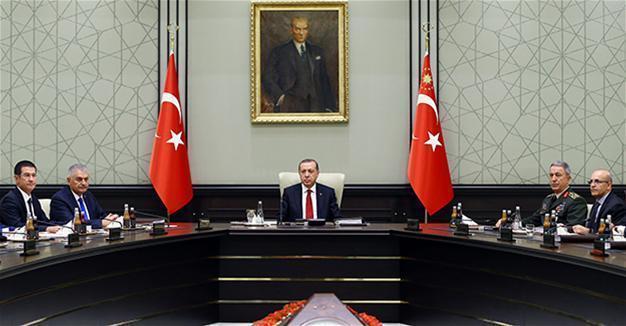State of emergency to be extended by the government
ANKARA

AA photo
Turkey’s government is expected to extend the state of emergency it implemented in the aftermath of the July 15 coup attempt after the country’s security council called for its prolongation in a move that received President Recep Tayyip Erdoğan’s enthusiastic backing.
Addressing village chiefs for a 27th time, Erdoğan said the current issue at hand regarding Turkey’s fight with terror needed more time as it is so “deep” that it could not be solved in three months alone.
“This state needs time to be cleared of these terror organizations’ extensions. Now we are competing against time,” said Erdoğan, adding that the council meeting he headed recommended that the state of emergency be extended for three more months.
Erdoğan also expressed his confidence that the government would make “necessary evaluations and take necessary steps.”
The National Security Council (MGK), which convened for a nearly six-hour meeting on Sept. 28 in Ankara under Erdoğan’s direction, recommended that the state of emergency be extended beyond its initial three-month period while also making a number of statements on the July 15 coup attempt, Turkey’s Syria policy and counter-terrorism.
“It has been agreed to recommend an extension of the state of emergency in order to ensure the continuity of the effective implementation of the measures aiming at protecting our democracy, the rule of law and the rights and freedoms of our citizens,” read the statement issued after meeting.
After the coup attempt, which killed more than 240 people and injured nearly 2,200 others, Turkey declared a state of emergency on July 20.
The opposition Nationalist Movement Party (MHP), meanwhile, also expressed its support for an extension of the state of emergency, saying the fight against those behind the July 15 coup attempt was continuing at all levels and that this was “natural and right.”
MHP leader Devlet Bahçeli said during a meeting on Sept. 29 that the “deep cleaning within the state” was continuing and that it would be “overly optimistic to expect it to end in short period.”
According to the Turkish Constitution, a state of emergency can be declared for a maximum period of six months.
To enact the state of emergency, the government must see serious indications of widespread violence that could interfere with Turkey’s democratic environment or its citizens’ basic rights and freedoms as established by the constitution.
Following a Sept. 26 cabinet meeting, government spokesperson Numan Kurtulmuş said the issue of an extension had not been broached.
Deputy Prime Minister Mehmet Şimşek on Sept. 29 also said that as the government, they would evaluate this suggestion and do “whatever is necessary.”
When the state of emergency was first introduced in the aftermath of the failed coup, Turkish Justice Minister Bekir Bozdağ had said taking the necessary measures after the coup attempt might take less than three months.
“We set three months, but we don’t have to complete these three months. We aim to take steps, do what we should do, and lift the state of emergency before the time runs out,” Bozdag said.
The MGK also insisted on a “terror-free zone” and a “no-fly zone” in northern Syria as well as recognizing July 15 as a special day.
Meanwhile, President Recep Tayyip Erdoğan said that July 15 would be declared a holiday to commemorate the victims of the coup attempt.
“July 15 will be declared a holiday to commemorate our martyrs and veterans as the Day of Commemoration of Democracy and Freedoms,” Erdoğan told village chiefs on Sept. 29, one day after the national security council made a proposal on the matter.
The statement also underlined the decisive fight against terrorism.
“It is strongly noted that the administrative and legal actions taken against municipalities which use the state and the nation’s resources to support terrorist organizations instead of [carrying out] their [municipalities’] primary duties are to the point and the studies concerning this issue will be continued,” it said.
The statement also criticized the European Parliament and accused the European Union of being insensitive to terrorism.
“Permitting the terrorist organization’s symbols in the corridors of European Parliament and the insensitive attitude of some fellow and allied EU countries regarding exhibitions and meetings of terrorist organizations like the PKK/PYD and YPG are deemed worrisome, and it has been also noted that terrorism has become an instrument of international politics and even been encouraged. An international definition of terrorism must be made and the importance of cooperation must be underlined to prevent [contradictory interpretations],” it said.
The PKK refers to the outlawed Kurdistan Workers’ Party, while the PYD is the largely Syrian Kurdish Democratic Union Party. Its armed wing in the battle against jihadists is the People’s Protection Units (YPG).
